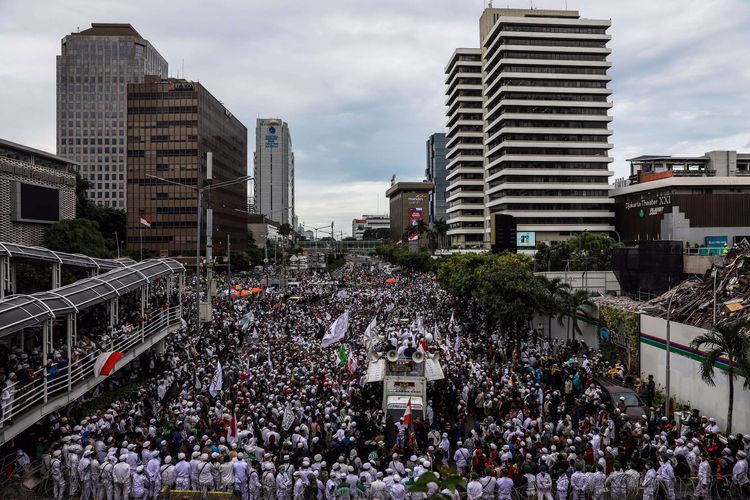Popular Reads
Top Results
Can't find what you're looking for?
View all search resultsPopular Reads
Top Results
Can't find what you're looking for?
View all search resultsRI’s Islamic populism still fragmented: Expert
“In Turkey, you’ve had Islamic populism dominating the state. In Egypt, you’ve had Islamic populism dominating civil society. In Indonesia, and this may be controversial to some people, I’d suggest that Islamic populism has failed to dominate either civil society or the state,” a professor of Asian Studies has said.
Change text size
Gift Premium Articles
to Anyone
T
he throng of people who welcomed the return of Islam Defenders Front (FPI) leader Rizieq Shihab might be an indicator of the cleric’s popularity, but political researchers have said that this does not necessarily indicate that Islamic populism is strengthening in Indonesia.
Director and professor of Asian Studies at the University of Melbourne Asia Institute Vedi Hadiz said there had yet to exist a political vehicle that allowed Islamic populism to gain a front row seat in Indonesian politics.
He studied Islamic populism in Turkey, Egypt and Indonesia and noted several differences.
“In Turkey, you’ve had Islamic populism dominating the state. In Egypt, you’ve had Islamic populism dominating civil society. In Indonesia, and this may be controversial to some people, I’d suggest that Islamic populism has failed to dominate either civil society or the state,” he said.
One of the reasons for this was that no single party could claim leadership of the ummah (Islamic community) in Indonesia, Vedi said in an online discussion hosted by Airlangga University on Tuesday. In Indonesia, there was no Justice and Development Party (AKP) like in Turkey, nor was there the Islamic Brotherhood (IM) like in Egypt, he added.
The absence of such groups made Indonesia’s Islamic populism fragmented and ineffective, whether under authoritarian or democratic leadership, Vedi said.
He explained that Islamic populism was a product of “broken promises” of modernity and neoliberalism and the response of the marginalized lower class to form “an imagined unified ummah” amid the failure of the oligarchy-dominated democracy to create a more just society.
https://www.youtube.com/watch?v=5j7mfqKvlzA
A major hindrance to stronger Islamic populism in Indonesia was the absence of a “big Muslim bourgeoisie” because capital was dominated by Chinese-Indonesians or cronies of the political elite.
“The lack of the big bourgeoisie has lots of consequences, one of them being the inability of Islamic mass organizations to cultivate disciplined lower-class support because there is no money to develop sustained and really rooted social charities, unlike in Egypt or Turkey,” Vedi said.
Richard Robison, a leading political economist at Murdoch University, has studied populism outside of Islam, such as populism in the United States, and analyzed why people listen to United States President Donald Trump.
“The first thing we have to understand [about] populism is that it emerges from a social crisis: war, agrarian collapse and urbanization, the decline of manufacturing, globalization and immigration,” Robison explained.
“Populism involves political struggles against different enemies – the cosmopolitan professional classes, big business or global investors, foreigners or different racial and religious elites,” he said.
A lot of people who supported Trump were professionals with a degree who were resentful for not being valued properly, Robison said.
“Today, the populism of the Tea Party and Donald Trump is driven by the resentment of the declining middle [class],” said Robison.
In European cases, populism can be defined more by identity in terms of nationalist and religious reactions against educated classes and the influx of African, Asian and East European immigrants.
With Islamic populism, nascent forms exist as a reaction to the Western-dominated history of colonialism and imperialism in Muslim-majority societies, the researchers wrote in their presentation.
Vedi said that even though Rizieq was seen as a symbol of the struggle against Western imperialism and even though he was able to draw huge crowds of supporters, he was not well-connected enough with the oligarchy to have the resources to run as a politician.
“He can be valuable for political parties, whether religious or not. [Politicians] can befriend or make an alliance with him as he has the ability to mobilize followers,” Vedi explained.
“Parties are not able [to rally support the way Rizieq does] even though [Rizieq] is not in a position to take power.”
Vedi said that different politicians had different reactions to Rizieq’s return to Indonesia, even after the Indonesian Military’s removal of banners that were illegally installed by Rizieq supporters across Jakarta.
“The [members] of the alliance that surround President Joko “Jokowi” Widodo already have plans for a few years ahead and they have different ideas of this fellow Rizieq,” he said.
Meanwhile, Indonesian Political Review executive director Ujang Komarudin said that Rizieq would have a better chance of maintaining his popularity if he did not join a political party as he could avoid the risk of being viewed as partisan.
However, political parties could still form a partnership with Rizieq to use his influence to gain support and by doing so, Rizieq would still be allowed to criticize the government.
Rizieq Shihab returned to the country on Nov. 10, after almost three years of self-proclaimed exile in Saudi Arabia.
He was embroiled in several legal cases when he went to Saudi Arabia in 2017 reportedly for an umrah (minor haj).
In two of the higher profile cases implicating Rizieq, the National Police previously named him a suspect in a pornography case, as well as a suspect for allegedly insulting the state ideology, Pancasila.










